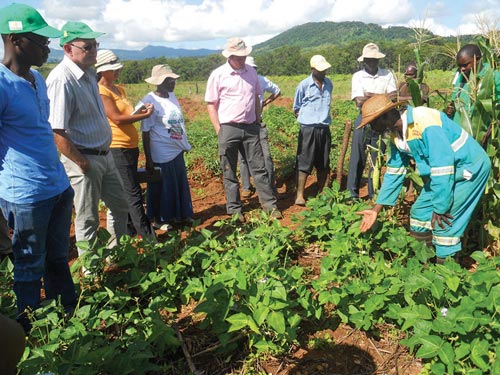When traveling from Chimoio to Tete along one of the main roads in central Mozambique, one inevitably passes through Malomue, a small rural village in Báruè District. Since 2008, conservation agriculture (CA) technologies and improved drought-tolerant maize varieties have been promoted to farmers through various donor-funded projects, including a USAID-funded Feed the Future initiative.
In the past, farmers in the area would cultivate their land, clear the surface of all protective cover and burn the residue from the previous cropping season. The main food security crop in the area is maize, and due to lack of access to improved seed, lowyielding landraces were often planted. The introduction of improved agriculture technologies developed and tested by the Platform of Agriculture Research and Innovation (PARTI) and the Collaborative Research Support Program (CRSP) of the Sustainable Agriculture and Natural Resource Management Lab (SANREM) at Virginia Polytechnic Institute and State University (Virginia Tech) implemented in collaboration with the University of Tennessee, have brought significant change to Malomue. Farmers have been exposed to improved seed, fertilizers, improved weed management practices and more sustainable planting techniques based on conservation agriculture principles and practices.
Josè Leuane Dicane, a rural farmer from the community with approximately 15 hectares of cultivated land, said, “The first lesson I learned is that no fire should enter my plots, and I have managed to avoid burning grass from my neighbors.” Dicane also appreciates the reduced labor required when chemical weed control options and direct seeding techniques are used, as well as the increased moisture retention and fertility increases when legume crops are rotated and crop residues are kept on the soil surface. Improved drought-tolerant maize varieties, developed by CIMMYT and extended through Mozambican private seed companies, have further increased the yields on the fields of farmers such as Dicane. Dicane and his large family have become food self-sufficient. He has planted a garden where he produces higher value horticulture crops under small-scale irrigation, and has become an emerging commercial farmer by successfully selling his produce at a profit in the nearby town of Catandica.
The project has identified him as one of the most visionary and successful farmers in central Mozambique, worthy of sharing his experiences with others in the world. With support from USAID, Dicane and his wife were invited to go to the United States to attend a meeting of SANREM/CRSP. On 16 May, Dicane and his wife Judisse boarded an airplane on their way to the U.S. Neither had ever flown, stayed in a hotel or seen the world outside of Mozambique. This was the experience of a lifetime for them. During the SANREM/CRSP meeting on 20 May, they shared their new farming expertise with other participants and farmers. They spoke as if they had presented to an audience many times. Their very impressive report on the lives of rural farmers from Mozambique made a difference to many of the participants. The farmers from Malomue have been given a voice and the opportunity to describe the gradual changes in their lives. The changes might be small, but viewed through another lens, they are also groundbreaking.
 Capacity development
Capacity development